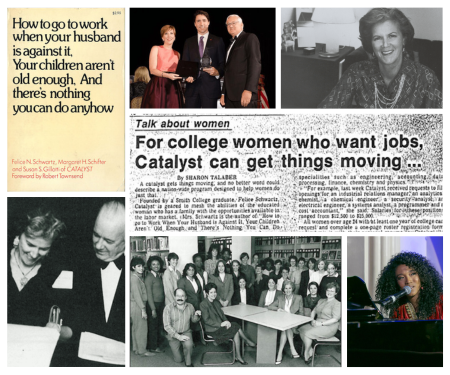Our history
Founded by Felice Schwartz, Catalyst has been making workplaces that work for women—and for everyone since 1962.
Introduction
When founder and first president Felice Schwartz created Catalyst in 1962, “Help Wanted” advertisements were segregated by gender and race, and the law permitted companies in the US to pay women less than men. Since then, the landscape has changed dramatically and so has Catalyst.
Today, we are the go-to expert on advancing gender equity at work and help organizations drive systemic change with our original, intersectional research, global communities and convenings and actionable solutions. We address the most pressing workplace challenges by focusing in three core areas:
- How to attract, retain & advance women from the frontline to the C-suite
- Build allyship & advocacy to close gender gaps
Create inclusive cultures & support wellbeing
Explore our history
1960s to 1990s | Early 2000s | Early 2020s | 2025 and beyond | Historical timeline
1960s to 1990s: Building workplaces that work for women
When Catalyst launched, our focus was on helping women enter the workforce and thrive. We advocated for flex time, part-time work, and job-sharing—unheard-of concepts at that time—and demonstrated to employers that they were effective solutions. Founder Felice Schwartz’s wildly popular 1972 book, How to Go to Work When Your Husband Is Against It, Your Children Aren’t Old Enough, and There’s Nothing You Can Do Anyhow, made the case that companies should hire women who had spent time out of the workplace to raise families because they made great employees.
During the 1970s, Catalyst operated national career resource centers to assist women and drove the conversation about women in corporate leadership. We helped companies identify qualified women for their boards of directors and tracked and publicized the number of women on boards.

By the late 1980s, Catalyst recognized that the obstacle to women’s advancement was not the women themselves. We made a critical shift to focus on what companies should do to create more women-friendly workplaces. Our hard-data, bottom-line approach helped us understand how to change organizational behavior to drive inclusion. We transformed our prestigious Catalyst Awards from a recognition of individual women into an honor for companies with proven results in advancing women.
In the 1990s, Catalyst studied the careers of MBA graduates from top business schools across the globe over a decade and demonstrated that sponsors—people who use their influence to get women visible opportunities—are key to career advancement.
In 1998, we became an early, and consistent vocal advocate for inclusive workplaces with the launch of a series of research on women of color in corporations.
Early 2000s: Expanding globally to accelerate progress for women
In 2000, Catalyst opened an office in Canada, followed by Europe in 2006.
The Catalyst commitment to advancing women to senior leadership continued with the Catalyst Women On Board™ initiative. Launched in 2007 in Canada it matched CEOs and board chairs with women to sponsor. The program later expanded to the United States in 2015 and by 2020 over 60% of Catalyst Women On Board™ alumnae had been appointed to corporate boards.

In 2009, after nearly five decades of focusing on women in the workplace, Catalyst committed to understanding the role that men play as critical agents of change. In addition to our research, we pioneered the groundbreaking MARC (Men Advocating Real Change) initiative. This programming inspires employees of all genders to co-create equitable workplaces and be advocates for equity.
Today, over 10, 000 people across 30+ countries have taken the program. Known as the MARC Alums, this community has made measurable impact across the globe and is able to connect via regular virtual events, 1:1 networking, and other discussion forums.
To recognize people who represent the gold standard for inclusive leadership in corporate Canada, we launched Catalyst Honours in 2010. These exceptional business leaders accelerate progress for women in the workplace and their examples motivate others to build inclusive workplaces.
Catalyst continued to expand its research and tools, focusing on helping companies adapt to changes such as artificial intelligence, social movements, demographic shifts, and global disruptions. Our goal was to expand and enhance talent pools to create more innovative and inclusive work teams.
To measure progress, in 2017 Catalyst launched a benchmarking program, the Catalyst CEO Champions For Change initiative, which encouraged companies to share case studies and organizational data.
Early 2020s: Shaping conversations on race and inclusion
In the wake of the COVID-19 pandemic and the spotlight on racism, Catalyst helped shape awareness that organizations must have challenging conversations around race and racism.
In 2022, our groundbreaking three-year study on the barriers women of color face in the workplace, stirred national conversation in the US. This research named and detailed the concept of “Emotional Tax,” which is the state of being on guard—consciously preparing to deal with potential bias or discrimination. Catalyst integrated this research into its innovative trainings designed to cultivate more inclusive leaders.

In 2023, we launched new research on frontline employees and the unique barriers to recruiting and retaining these individuals, particularly women. These insights fueled the development of a new line of solutions, Moments that Matter and MARC For the Front Line, which enable frontline leaders and employees to build more positive workplace cultures.
The same year, Catalyst expanded its impact and reach by becoming a recertification provider for the Society for Human Resource Management (SHRM), a global professional human resources membership association. This designation recognizes our high-quality, effective learning and development opportunities by allowing HR professionals who attend Catalyst webinars and events to gain professional development credits.
2025 and beyond: Equipping leaders to navigate change and drive growth
Today’s workplace is being reshaped by seismic changes in technology, societal expectations, and workforce demographics.
Women represent the 75% aiming for senior leadership roles. Yet, progress in achieving workplace equity has been slow—and in many areas, it is now stalling.
The cost to businesses is high. Organizations that fail to adapt risk losing top talent, which can be costly as well as impact innovation, culture, and long-term growth.
Catalyst continues to evolve, and in 2025 released a new digital experience, powered by cutting-edge technology, to enhance how it can deliver its intersectional research and solutions to organizations.
Starting with a modernized web experience, with new features such as a community platform coming in March 2025, the new digital platform empowers HR professionals to prepare their organizations for the next future of work, where inclusive workplaces foster sustainable growth.
Historical timeline

1962
Catalyst is founded
Felice Schwartz launches Catalyst.
1973
Career resources centers
Catalyst national network of career resource centers offer career counseling.
1977
Elevating women to boards
Catalyst launches the Corporate Board Placement Service to help companies identify qualified women to their board of directors.
1987
Driving organizational change
Catalyst begins to honor companies advancing women’s progress with the Catalyst Award.
1998
Intersectional research
Catalyst begins publishing a groundbreaking research series about women of color in corporations.
2009
Engaging men
Catalyst researches men’s role in gender equity, leading to MARC.
2022
60th anniversary
Catalyst coins the term "emotional tax" and celebrates its 60th anniversary.
2025
A digital future
Catalyst launches its new digital platform.
Today

Join 400+ global Supporter organizations
Make diversity and inclusion your strategic advantage. Start creating high-performing workplaces, unlock new levels of productivity, and prepare for what’s next.